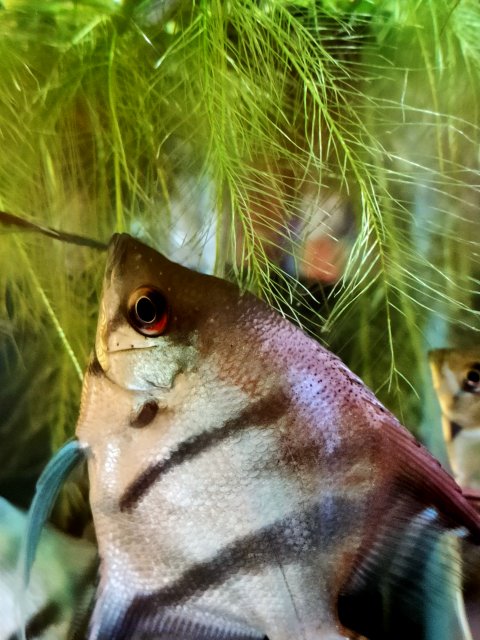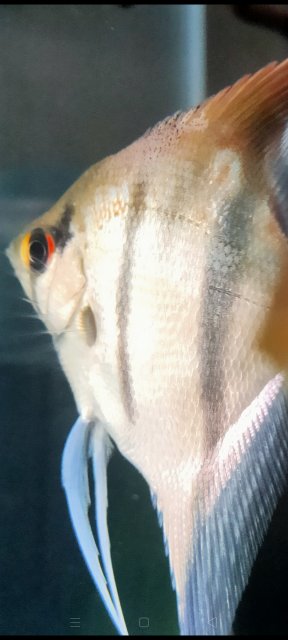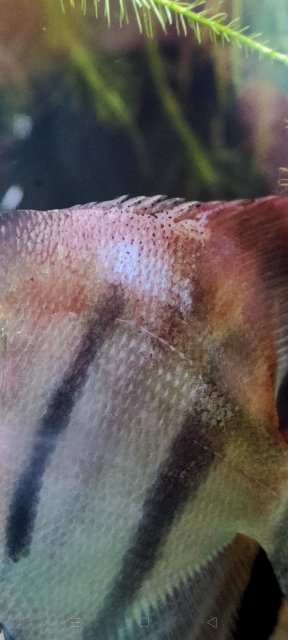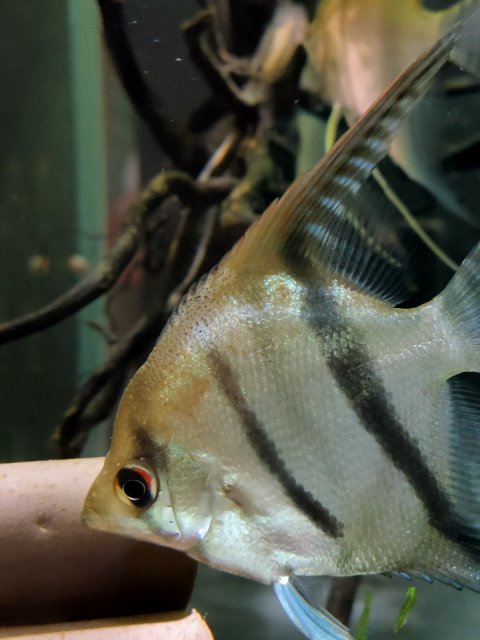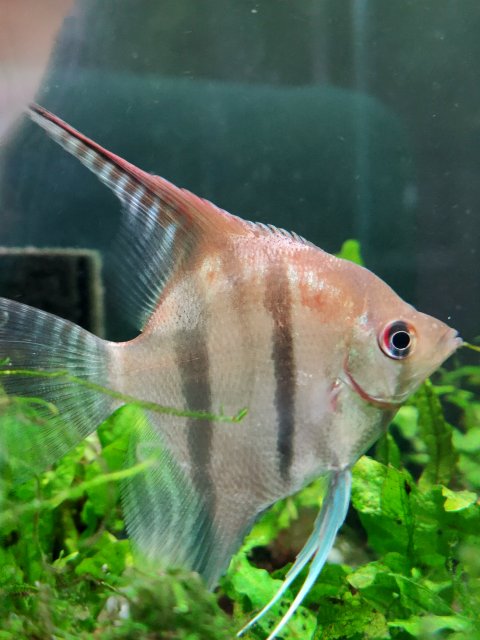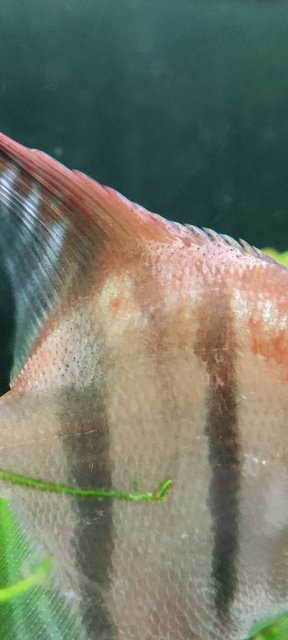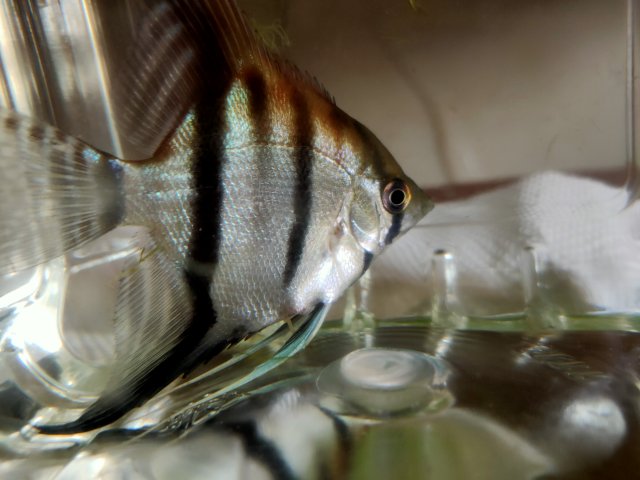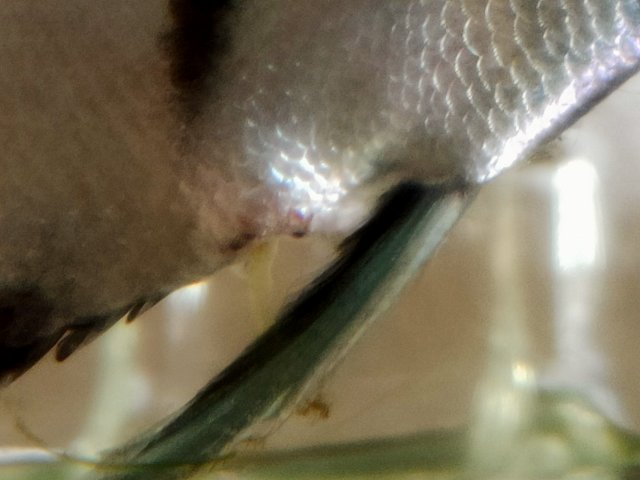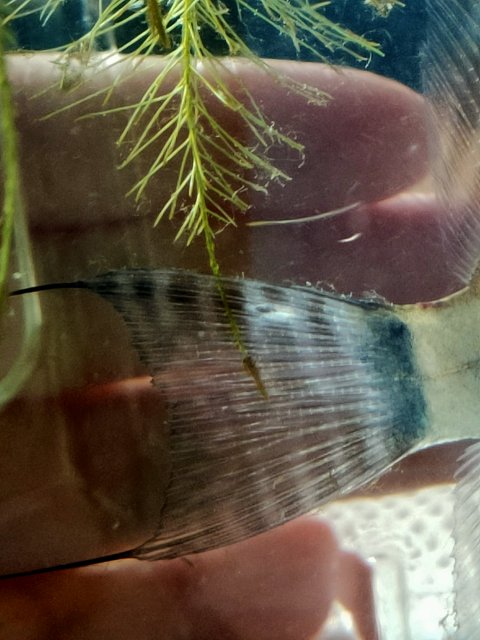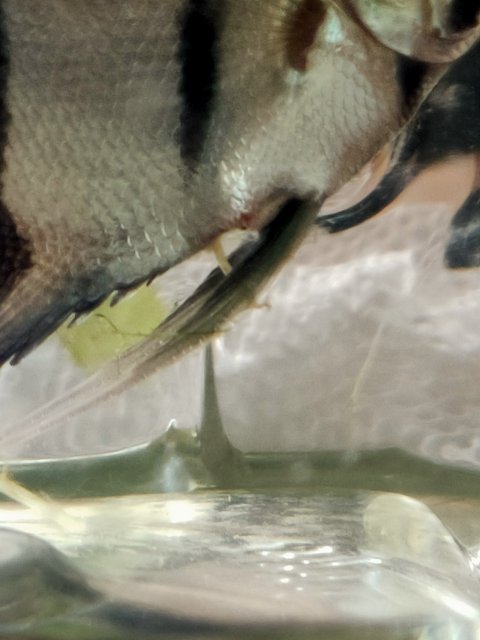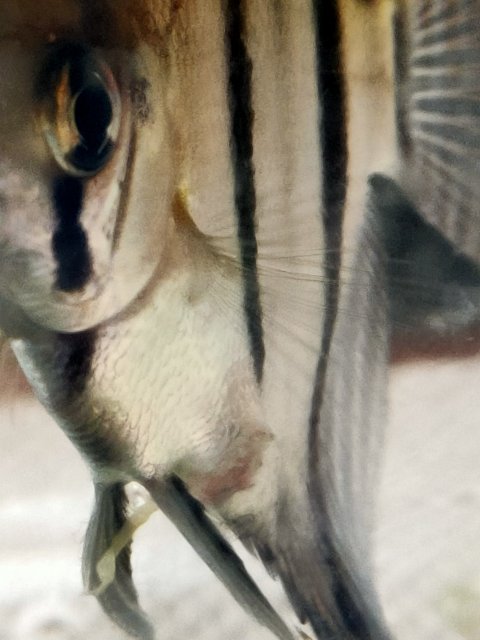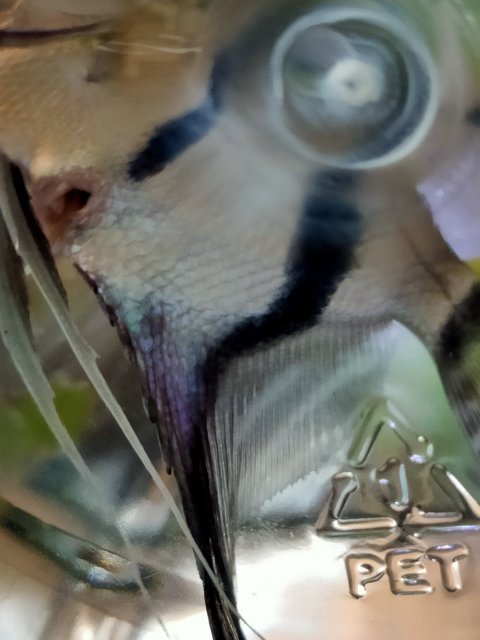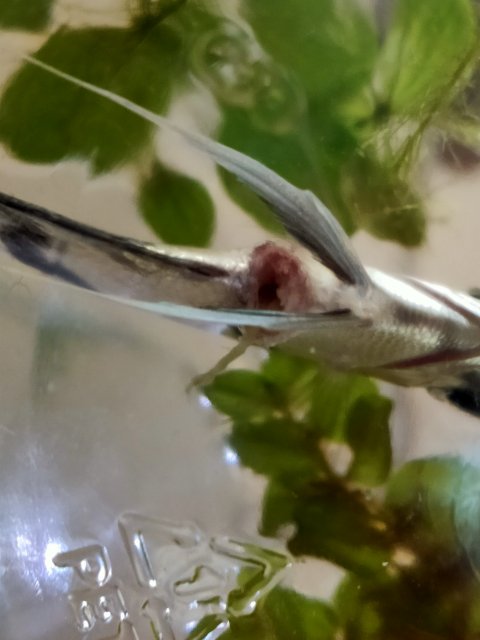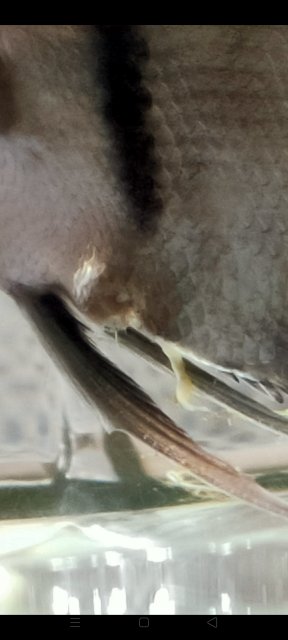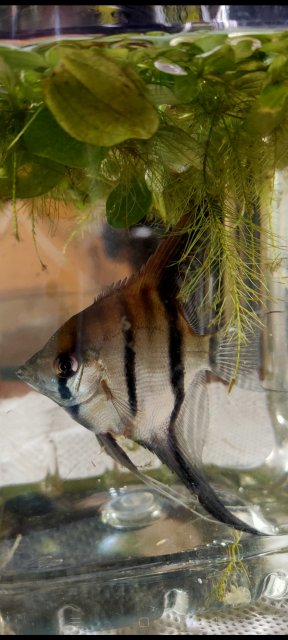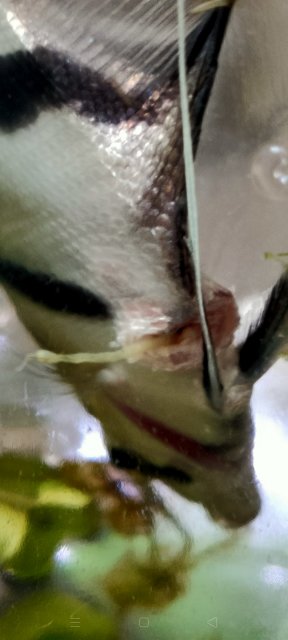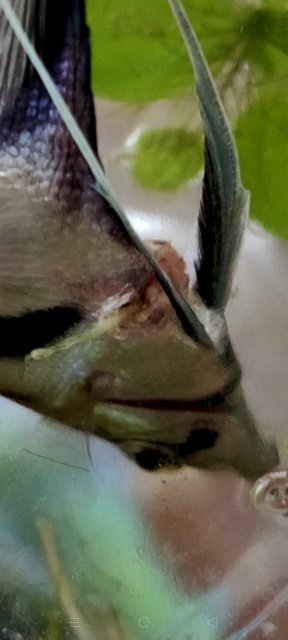- Have you tested your water?
- Yes
- If yes, what is your ammonia?
- 0
- If yes, what is your nitrite?
- 0
- If yes, what is your nitrate?
- 15
- If I did not test my water...
- ...I recognize that I will likely be asked to do a test, and that water tests are critical for solving freshwater health problems.
- Do you do water changes?
- Yes
- What percentage of water do you change?
- 41-50%
- How frequently do you change your water?
- Every week
- If I do not change my water...
- ...I recognize that I will likely be recommended to do a water change, and water changes are critical for preventing future freshwater health problems.
Long post ahead! But any help is greatly appreciated because I seriously have no idea what to do at this point.
My brother and I are both having problems with some newly bought juvenile angelfish. He has 8 (4 from person A, 4 from Person B). I have 9 (4 from Person A, 5 from Person B) in our own tanks.
He is intending to keep all 8 of his/a pair, I am intending to grow mine out to resell once they reach 2-3 inches.
We bought them all on the same day and added them into our tanks on the same day. The ones from Person A are doing fine, perfectly healthy, aggressively eating and acting as normal angelfish should. But the ones from Person B have been odd since the start.
My brother fed his tank on the first day because he has corydoras in there and needed to feed them, all of his were eating fine. Those from Person B were a bit more reluctant to eat but still eating.
For my batch I fed them on day 2, the 4 from Person A were eating aggressively. 2 from Person B tried to eat but kept spitting out the food, 3 were eating reluctantly but still eating. Thought maybe they just weren't used to the new food/environment yet so didn't think much of it and continued to offer them different food options over the next few days. Some had white portions/completely white poop though but I wanted to give them at least a week to settle in before I put more stress on them by medicating.
By the end of Week 1, the feeding habits of those from Person B still had not changed except for one of the reluctant eaters now showing zero interest in food. Over the next several weeks I tried praziquantel, metronidazole and levamisole (separately, not all at once) since it seemed like a typical internal parasite issue (refusing food, white stringy ****, now sunken stomach for the one that stopped eating).
Oddly enough the one that stopped eating completely came back after the treatments as a voracious eater but 3 of the 4 others did the eat and spit (no eating) and the 4th one still ate aggressively.
We both have things to block line of sight (plants, large pieces of driftwood) and feed in at least 2 areas so we're prepared for aggression. So far that hasn't been an issue, the angelfish actually tend to stay in groups (normal at this size).
Our water parameters have largely been consistent over the weeks. These are what they roughly were.
Brother's tank:
Ammonia - 0
Nitrite - 0
Nitrate - 5 (surface covered by water lettuce)
My tank:
Ammonia - 0
Nitrite - 0
Nitrate - 10-20
These are the symptoms observed over the several weeks:
- Slow to eat/biting but spitting out food/completely not showing interest in food
- Part white part regular poop/white stringy poop/white thick poop
- Shaking head (not the usual display shaking)
- Flicking ventral fins against body
- Darting forward (usually in conjunction with flicking ventral fins)
- Losing colour on top third of body (only on one fish)
- Swollen vent (only on one fish)
- Listlessness (on that one fish that stopped eating but is now eating aggressively after treatment, no longer an issue but thought to include it to give as much info as possible)
Now at this point the one that was an aggressive eater in my tank all along is starting to eat reluctantly, sometimes doing the eat and spit and only eating a few pellets. Part of its colour near the dorsal fin has turned a pale white. The one that recovered and became an aggressive eater is still eating well. The other 3 are still doing the eat and spit.
In my brother's tank 3 are the doing the eat and spit, I noticed one had a strange vent (swollen on one side) and was not eating. I tend to watch each individual fish of mine more closely than he does his, so I have no idea how long that fish has had it. I put down that fish today as it seemed that after one round of levamisole there was still no difference and it had continued to get worse (swollen open about 1cm width). It was just not ethical to continue to let that fish suffer in hopes of finding some way to treat it.
I have pictures of its vent that I took while it was in the container I put it down in. The pictures are quite nasty so I will only post them if they will help and add a trigger warning.
My brother and I are both having problems with some newly bought juvenile angelfish. He has 8 (4 from person A, 4 from Person B). I have 9 (4 from Person A, 5 from Person B) in our own tanks.
He is intending to keep all 8 of his/a pair, I am intending to grow mine out to resell once they reach 2-3 inches.
We bought them all on the same day and added them into our tanks on the same day. The ones from Person A are doing fine, perfectly healthy, aggressively eating and acting as normal angelfish should. But the ones from Person B have been odd since the start.
My brother fed his tank on the first day because he has corydoras in there and needed to feed them, all of his were eating fine. Those from Person B were a bit more reluctant to eat but still eating.
For my batch I fed them on day 2, the 4 from Person A were eating aggressively. 2 from Person B tried to eat but kept spitting out the food, 3 were eating reluctantly but still eating. Thought maybe they just weren't used to the new food/environment yet so didn't think much of it and continued to offer them different food options over the next few days. Some had white portions/completely white poop though but I wanted to give them at least a week to settle in before I put more stress on them by medicating.
By the end of Week 1, the feeding habits of those from Person B still had not changed except for one of the reluctant eaters now showing zero interest in food. Over the next several weeks I tried praziquantel, metronidazole and levamisole (separately, not all at once) since it seemed like a typical internal parasite issue (refusing food, white stringy ****, now sunken stomach for the one that stopped eating).
Oddly enough the one that stopped eating completely came back after the treatments as a voracious eater but 3 of the 4 others did the eat and spit (no eating) and the 4th one still ate aggressively.
We both have things to block line of sight (plants, large pieces of driftwood) and feed in at least 2 areas so we're prepared for aggression. So far that hasn't been an issue, the angelfish actually tend to stay in groups (normal at this size).
Our water parameters have largely been consistent over the weeks. These are what they roughly were.
Brother's tank:
Ammonia - 0
Nitrite - 0
Nitrate - 5 (surface covered by water lettuce)
My tank:
Ammonia - 0
Nitrite - 0
Nitrate - 10-20
These are the symptoms observed over the several weeks:
- Slow to eat/biting but spitting out food/completely not showing interest in food
- Part white part regular poop/white stringy poop/white thick poop
- Shaking head (not the usual display shaking)
- Flicking ventral fins against body
- Darting forward (usually in conjunction with flicking ventral fins)
- Losing colour on top third of body (only on one fish)
- Swollen vent (only on one fish)
- Listlessness (on that one fish that stopped eating but is now eating aggressively after treatment, no longer an issue but thought to include it to give as much info as possible)
Now at this point the one that was an aggressive eater in my tank all along is starting to eat reluctantly, sometimes doing the eat and spit and only eating a few pellets. Part of its colour near the dorsal fin has turned a pale white. The one that recovered and became an aggressive eater is still eating well. The other 3 are still doing the eat and spit.
In my brother's tank 3 are the doing the eat and spit, I noticed one had a strange vent (swollen on one side) and was not eating. I tend to watch each individual fish of mine more closely than he does his, so I have no idea how long that fish has had it. I put down that fish today as it seemed that after one round of levamisole there was still no difference and it had continued to get worse (swollen open about 1cm width). It was just not ethical to continue to let that fish suffer in hopes of finding some way to treat it.
I have pictures of its vent that I took while it was in the container I put it down in. The pictures are quite nasty so I will only post them if they will help and add a trigger warning.



